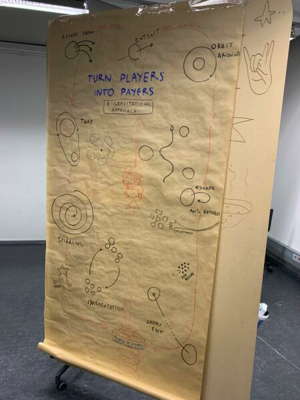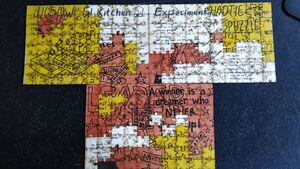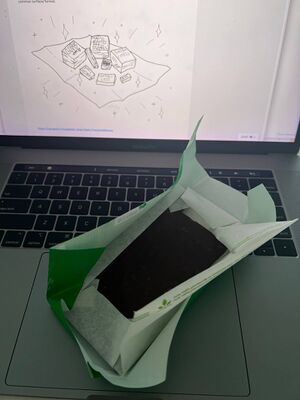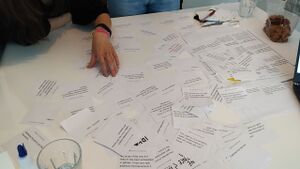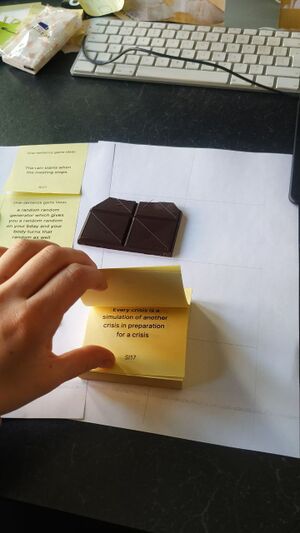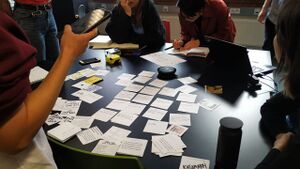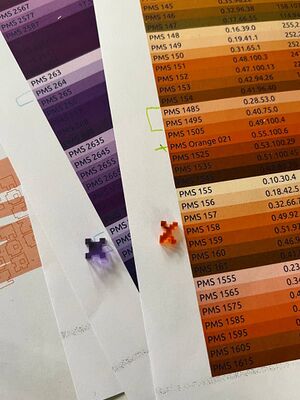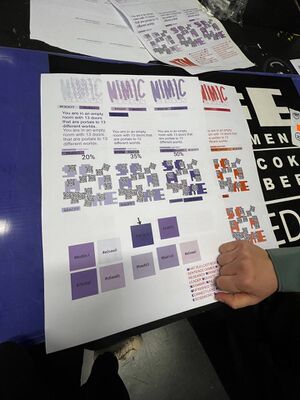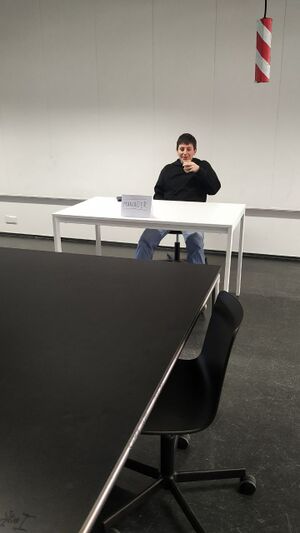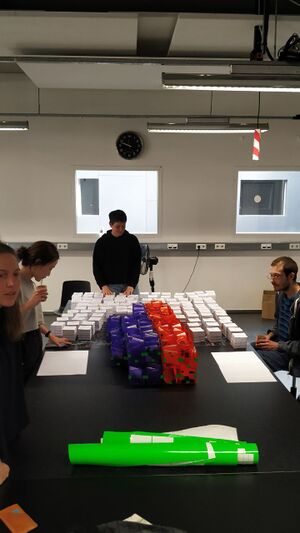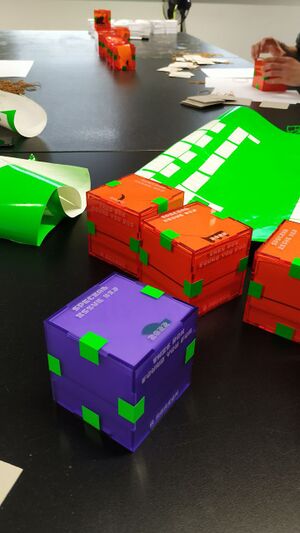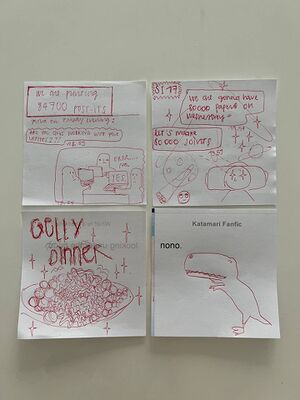User:Erica
Bonzurrr some documentation and sparse reflections about these 2 first terms.
SI16 Vernacular Language processing
info
Our Special Issue is a toolkit to mess around with language: from its standard taxonomies and tags, to its modes of organizing information and its shaping knowledge. With these tools we want to legitimize failures and amatorial practices by proposing a more vernacular understanding of language. We decided to release the Special Issue 16 toolkit in the form of an API (Application Programming Interface). APIs organise and serve data on the Internet; what is not always evident is that they facilitate exchange of information following mainly commercial purposes. However, Our API is an attempt at a more critical and vernacular approach to such model of distribution. We approach the text as a texture, a malleable clay tablet, a space for foreign input and extensive modifications, for cut-up and for collage, for collective agency and participation. Not a surface but a volume, in which the text is not only text, but a shared space. We work to sort out several meanings from the same text. We intend to blur our roles as authors, users and public because this is an act of collective world building.
the process
first approach with annotations
📑 https://pad.xpub.nl/p/Performative_Materiality_and_Theoretical_Approache
annotation of Performative Materiality and Theoretical Approaches to Interface, by Johanna Drucker
with Kamo Jian and Supi
first approach with python
grr's faces and house of dust with random.choice() I really had a lot of fun with line printers
((((((°)))))) ..................................
/ > < | ////////////////////////////////// \
S WW S ////////////////////////////////// \
\ v======v / ................................. |
\___________/ |A barrack OF GLASS
| BY A RIVER
| USING baby mosquitos
| demolished BY xpubbers
mix of sources
📑 https://pad.xpub.nl/p/Group2.2 Great conversation with Carmen, Emma, Gersande and Miriam.
We started looking at possible outcomes for our first Special Issue. Back then we still had in mind the idea of creating a reader that travels, via delivery or correspondence, via chat and across different media. Looking retrospectively, this conversation brought to the formulation of a lot of premises around the approach and the distribution of the SI17, that were then processed into smaller aspects of it or even into different subgroups' projects.
Transcription exercise
📑 https://pad.xpub.nl/p/transcription_grgr_%2B_chaey with Chae (need to ask for the video to her)
Rejection
📑 https://pad.xpub.nl/p/Rejection_Glossary
here's the list of today (18/10/21) about rejection
\\\\\\\\\\\\\\\\\\\\\\\\\\\\\( ⓛ ω ⓛ *)\\\\\\\\\\\\\\\\\\\\\\\\\\\\\
autumn break & a lot of new toys for the soupboat
🎤 karaoke republishing tool
Which started from a joke with Kamo, but then became a more serious republishing tool and later on involved Mitsa, Alex and Chae as well (the project branched between the Room for Sound residency, although we couldn't continue, and a contribution that is now part of SI#17)
🥣 soup-generator
A collaborative cookbook of soup recipes added to a json file via python, with tag system and diary.
🍜📔 soup-diary
Here I learned to use wiki's api to print via js in order to use the wiki as a cms and print the contents on a html page on the soupboat Diary of a 🥣 eater
🎉 B-day counter
WIP
\\\\\\\\\\\\\\\\\\\\\\\\ end of autumn break \\\\\\\\\\\\\\\\\\\\\\\\
study week
html workshop with Kamo Pimp my Soupboat
still talking about rejection, but now in a more conscious way.
great workshop with Nor this was my self-portrait
Replace() and Rejection as filter, empowerment and forced poetics
📑 https://pad.xpub.nl/p/si16-protoyping-week-7
experiments with the replace function
The first experiments with text processing were approaching text as something that has some fixed part and some more malleable and soft ones. The idea was to intervene physically on the text manipulating some part like a clay tablet in which certain areas are not dried yet. In this process some part were confirmed, while others rejected and substituted with other words or emojis, in order to decontextualise the text and give to it a new meaning.
The 🌛 anus, excerpt from Bataille's The solar anus, replacements with emojis. With Mitsa
Chimeric API, an original essay by Tiger Dingsun in which the terms graphic design are replaced with API. (insert link) with Kamo & Mitsa
Forced Documentation, an original excerpt by Edouard Glissant, in which the word 'poetics' has been replaced with 'documentation' (insert link) with Mitsa & Carmen
Ok, from this moment on, the process began to be more focused towards the making of an API and the subgroup's project
And I wish you that your question has been answered
with Carmen, Miriam and Mitsa
This text is a transcribed excerpt from the Press Conference that followed the meeting between the Greek Prime Minister Kyriakos Mitsotakis and the Dutch Prime Minister Mark Rutte on November the 9th, 2021 in Athens. During the Q&A, the Dutch reporter Ingeborg Beugel asked Mitsotakis for clarity and honesty referring to pushbacks which Greek border guards keep committing towards refugees, while the Greek Government systematically conceals such violence. She continued by asking Mark Rutte what the political stance of the Netherlands towards refugees' relocation and Mitsotakis's policy would be.
The choice of this text as our source material has different reasons. First of all, we were interested in how language can produce categories and shape identities: how does wording create precise borders between the "us" and the "them"? Our second step would be reflecting on text processing strategies through which a speech or a narration can be recontextualised and reclaimed. By replacing or taking out words of a discourse, and thus making some parts of it interchangeable, we tried to highlight how its phrasing is never neutral, but always a choice led by a particular purpose.
We decided to work on this text as the Press Conference took place at the moment we were developing our research, and as we were really interested on the distinctive rhetoric strategies that Beugel, Mitsotakis and Rutte choose for voicing their goals. It is clear that the reporter uses an emotional and provocative tone to address Mitsotakis' politics, which challenges his composure to a point where he can not keep it anymore, while when talking to Rutte, her speech is more calm and detached. In response to her question, both Prime Ministers refuse responsibility of their actions: they use a rather managerial and pre-designed language to neutralize the reporter's provocation while at the same time praising the generosity and the efforts of their countries. In particular, Mitsotakis denies any of Beugel's accusations and declares them as unsupported assumptions which is a mere demonstration of power. Alongside, Rutte uses a colder and more restrained language to rationalize the EU and the Greek Government's choices: While shifting the responsibilities for refugee protection, he actually justifies the crimes that are committed within the EU borders as an inevitable "tough, but fair, policy".
Concerning our project, it is an act of persistent resistance. We created a few functions to facilitate an iterative process of refusal towards the two Prime Ministers' answers and any of their possible versions. We invite you to play as much as you want with these functions and create your own answers as counter-reaction to Mark Rutte's final sentence: "So this is my answer and I wish that your question has been answered". Every new answer, every new iteration, can be submitted to our Archive of Repetitive Answers. Although they will never be good enough, nor shall they be accepted as exhaustive, we consider the modified answers as a trigger for a never-ending dialogue.
Learning how to walk while cat walking
from the restaurant's meme to we're making an API with Flask
did a prototype with strapi-nuxt and with node.js-express db, and mapped a possible structure of the SI#16 API together with Kamo.
In the end 👹 & 👺 introduced us to Flask's Magical world and we got trapped. In a good way.
And we dropped the idea of using rejection as conceptual compass for our vernacular APIs: it was useful to lay the ground for a common understanding of the topic, but we realized rejection was about to become a whole new topic while the main one was slipping out under our noses.
Intro of the Special Issue
read on the website ↗ read on pad ↗
politics of the API
License + ToS of the SI#16 API + error messages read on pad ↗
API key backend with Kamo.
sparse reflections
from Reflective Diary about the Special Issue 16
Publishing something through an API is something that still blows my mind. I've always been interested in how technologies shape the transmission of knowledge between different systems, creating often unfair relations of power, so I really appreciated the fact of being able to speculate on the politics of an API that translates information according to our beliefs and values. I'm really interested in creating the conditions for a production of culture in which those relations of powers are balanced out by intervening on its very infrastructure.
I also really liked the idea of messing around with different registers of language. When in our group we where discussing about the power of broken English and the songs by Linton Kwesi Johnson, and then when we intervened on the text of Mitsotakis's public speech, I felt there was something important at stake, and I'd really like to include this process in my future projects.
In some pages of my notebook I wrote:
Why should you use a tool that you don't master?
- because it's a way to address people who know how to use it, i.e. high specialized pepople
- because it's a way to break hierarchies
- in order to widen the access to that tool by claiming back the legitimacy to use it in a non-professional way
- because there is a desire for gaining agency, of feeling legitimized, accepted and ultimately liberated.
Understanding the implications of using an API as a publishing tool in 2021 was revealing and in a certain way liberating. Although I know some of us consider the concrete outcome of the SI16 a failure, I still think the means we used shall not be taken for granted at all.
SI17 Productive Play
info
This Special Issue explores how features of video–games are making us more, not less, productive. Life and work are gamified through social media, dating apps, and fitness apps designed to increase motivation and productivity. Gamification blurs the lines between play, leisure and labour, to release our collective dopamine for profit. Games in themselves often perform a reproductive role, presenting capitalism as a system of natural laws, exemplified by in-game predatory monetisation schemes.
On the other hand, games provide necessary down time and relaxation, helping people function in a largely dysfunctional economy and society. Yet leisure remains a contested space which is still unequally distributed, between genders, ethnicities and abilities. The form of the publication reworks the figure of the loot box, a typically virtual and predatory monetisation scheme.
The process
The process of the SI17 began with being nomadic inside the same block of houses for a month and finally slow-moving to Rdam South (park). And getting the 'rona. Which was actually a very good way to slowly start with the SI17. Maybe too slow? No, it was a nice pace, but I missed prototyping classes. A lot.
What is a loot box??
The loot box is a temporized tool for the distribution and management of resources between the inside of the gameplay and the outside of the gameplay. Loot box is like a pulse in the circulation of resources between virtual game and the reality outside of it. Loot box is temporized because it sets the beat, it's a repetitive rhythm for the player's temporality. It builds an habit by triggering the attention and the emotional response of the player, and ensuring that the player keeps playing potentially forever (from habit to addiction). The loot box is also a mechanism that focuses on individual engagement, a personalized 1 to 1 interaction, or 1 to machine interaction. an immediately rewarding response preceded by a generally customized trigger. But these are also the things I would like to change or make them fairer in our SI17 loot box.
Contributions
🎧 Sound cancelling headset ideology
📑 https://pad.xpub.nl/p/noice_cancelling_devices_turns_off_also_your_inner
with Chae, Kamo, Mitsa
🎢 Mapping gamification with a gravitational approach
Glossary Productive Play
https://pzwiki.wdka.nl/mediadesign/Glossary_of_productive_play
🎶🎤 Karaoke
📑 https://pad.xpub.nl/p/si17-karaoke
with Al, Chae, Kamo, Mitsa
🍥 Katamari fanfic
📑 https://pad.xpub.nl/p/katamari-fanfiction
🧩 Chaotic evil jigsaw puzzle
Which never became part of the SI17, also because of production issues, B✨U✨T it had great experimental potential.
📑 https://pad.xpub.nl/p/chaotic-evil-puzzles
We printed 85000 post-its
with Kamo, Mitsa, Supi
Proposal to bring together all the contents:
📑 https://pad.xpub.nl/p/post-it
Post-it prototypes
Contact of the vendors for printing and field trip to think along with the printer guys. One of them gave us this precious colour chart:
contribution to the visual identity:
🖱 https://www.figma.com/file/wVdpA2iwKN3hT9YXONqXTj/SI17
For the generation of the post-it we used Kamo as a tool ( :-( ). B✨U🎉T we used GIT to update contents, which was extremely helpful and fastened our collaboration a l00t.
The website has been created all together in our subgroup.
We started a real production line to assemble the boxes.
sparse reflections
In this SI17 I had the pleasure of taking care of more admin tasks, I quite enjoyed dealing with the vendors and learn how things of this kind get produced.
It was generally a better experience in comparison to the last special issue.
From time to time I found myself at ease in the role of a facilitator, which is kinda new to me.
One aspect I'll bring with me is that it was impossible to calculate and design the overall actual appearance of the loot box in every detail. Indeed the stack of post-its was actually shorter, the letters were thicker, etc. Neither was possible to foresee the interaction of the public with the contents. During the process of production, it's extremely important to keep in consideration some sort of margins, not only literally, especially when dealing with unpredictable "crazy experimental expensive shit". :)
Unpredictability is an element that is fundamental to me because it vanifies the arrogance of conducting and designing a project on the basis of mere expectations or assumptions. Unpredictability also opens breaches and includes different points of view in a process that would be otherwise imposed top-down. It requires a lot of feedback and verification moments, and helps to let things go when they become too cherished but also too much.
We have a lot of focus on how we work together, yet I have the feeling our needs and purposes in xpub are very different, this would sometimes lead to frustration when priorities are distributed over learning and production process.
I'm also interested in the pedagogical aspect of our publications and took down a note few days ago:
Education:
- to emancipate from education itself
- to build confidence (rather than specialized skills)
- to verify and manipulate reality
- to recognize and address personal / collective needs.
Further interests
I've started reading Border Ecologies few weeks ago, it talks about ecosystems, ecologies and economies that developed at the border between Hong Kong and Mainland China before HK lost its fragile independency. I can't stop thinking of applying the same methods described in the book to cultural production as well. Especially this idea of meshwork publishing is haunting me since then, but maybe we'll have time to talk about it during/after assessments.
SI18 Radio Implicancies
thank you for reading until the very end!! ciao ciao


![thumb]](/mw-mediadesign/images/thumb/a/a6/277212447_677150646857991_854869514669607839_n.jpg/300px-277212447_677150646857991_854869514669607839_n.jpg)


